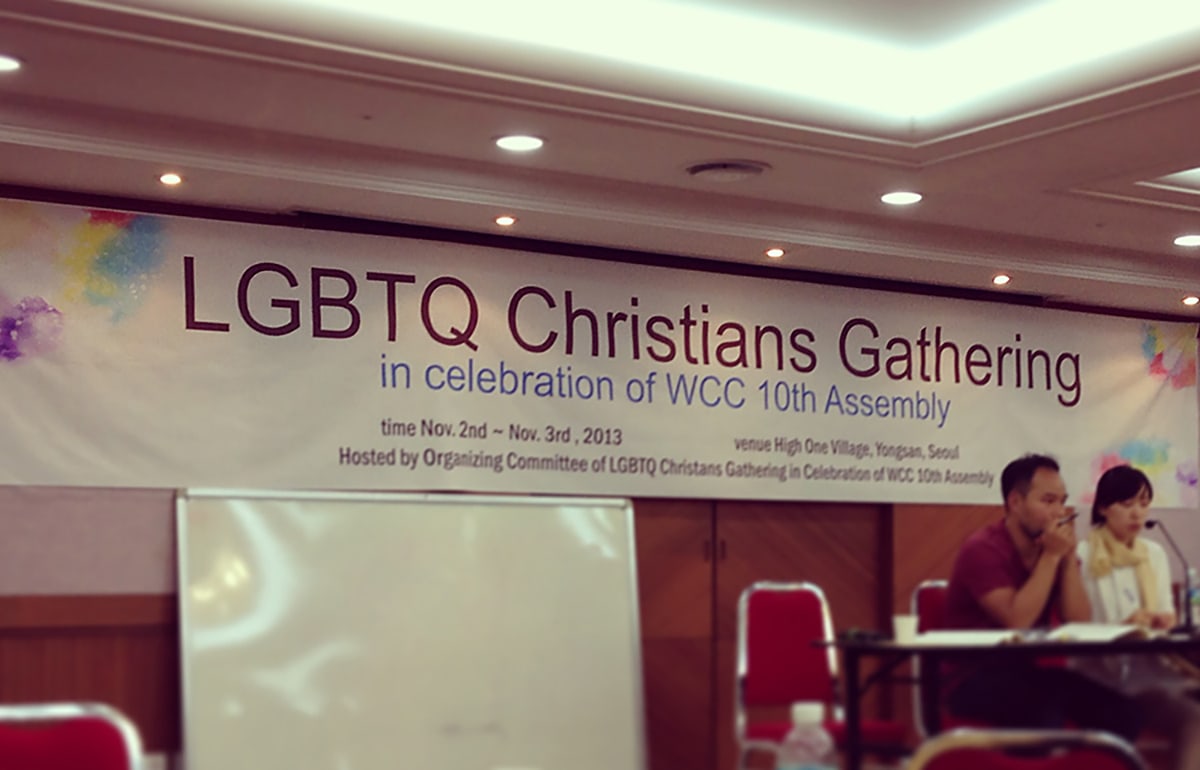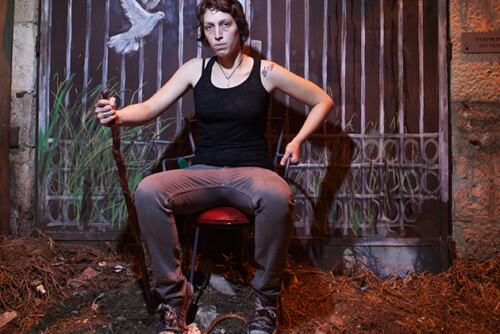Article note.1

On November 2, 2013, an international LGBTQ delegation attending the 10th Assembly of the World Council of Churches (WCC) traveled to Seoul to participate in a daylong gathering. Over twenty delegates—mostly from North America and Western Europe but also a few delegates from South Africa, Indonesia, and Uganda—joined South Korean clergy, lay, and secular activists to share strategies and experiences of grassroots organizing, political challenges, and theological interpretations. Put differently, the gathering assembled diverse identities and positionalities: Christian-identified queer activists, straight-identified religious allies, and secular activists without religious affiliation. They had plenty in common. They were meeting together to imagine the collective possibility of dismantling homophobia on multiple scales: families and local congregations, municipalities and urban polities, national and international denominations, transnational interfaith organizations, and spaces of international solidarity and collaboration. As if to demonstrate the remarkably postsecular political moment in South Korea, the Christian gathering was held at a venue affiliated with Won Buddhism—an old, indigenous religion that fuses elements of Buddhism, Confucianism, and Daoism—recognized as an important promoter of peace and inter-religious dialogue in contemporary South Korea.2
Signatories for the jointly drafted statement that resulted from this Christian gathering—Declaration of Sexual Minorities in South Korea and Supportive Overseas Partners with Their Allies in Celebration of the World Council of Churches 10th Assembly—included delegates from Canada, Denmark, Germany, Indonesia, Latvia, the Netherlands, South Africa, South Korea, Romania, Spain, the United States, and Uganda (listed in alphabetical order). There were organizations, too. Non-Korean organizational signatories were the Metropolitan Community Churches (US), the Global Justice Institute (Indonesia), the Euroregional Center for Public Initiatives (Romania), St. Paul’s Reconciliation & Equality Centre (Uganda), the European Forum of LGBTQ Christian Groups, The United Church of Canada, Inclusive and Affirming Ministries (South Africa), Reconciling Works (Minnesota, US), and the United Church of Christ USA. Representing South Korea were Sumdol Presbyterian Church, Open Doors Community Church, Rainbow Action against Sexual-Minority Discrimination, and Chasegiyeon (Christian Solidarity for World without Discrimination). Their joint statement read in part as follows:3
We confess the dignity of every person created in the image of God, and we also confess with faith that the sexual orientation and gender identity & expression of each individual is a part of creation.
However, violence, abuse, discrimination, exclusion, stigma, and prejudice about sexual orientation and gender identity & expression occur frequently in our everyday lives. We confirmed in our gathering that the bigotry against sexual minorities is destroying precious lives and peace in our world.
Especially [sic], we underscore once again that the violent bigotry against sexual minorities in the name of Christianity fully contradicts the Christian mandate to ‘love thy neighbor.’ We […] unite and pray together so that this social abuse cease in the Korean society.
The statement underscores collective vulnerability and the need for solidarity rather than asserting a rights-based identity politics of recognition. It challenges the basis of Christian homophobia and calls for building a more inclusive church that affirms the lives of LGBTQ-identified Christians. Spaces like this gathering reflect a self-consciously religious turn in queer politics in South Korea. It is a politics that queer religion, insistently locating faith not as intrinsically opposed to queer sexualities and non-normative gender expressions but as compatible, even necessary, in the face of widespread bigotry and social stigma.
Social Movement Legacies
The idea that queer and faith-based communities are not fundamentally oppositional or mutually exclusive—that queers can be faithful or that faith can be queer—is hardly an audacious concept to queer theologians, scholars, and activists who have painstakingly cultivated critical discourse at the vexed intersection of gender, religion, and sexuality. But in contemporary South Korea, because conservative Protestants are vehemently promoting a trilateral platform of anticommunism, Islamophobia, and homophobia, progressive queer-religious formations operate as especially urgent and vital coalitional space. These formations draw not primarily from North American theories of intersectionality, but from the legacies of South Korean social movements in which religious leaders have played a critical role in siding with the oppressed and fighting for democratic social change. Religious leaders’ participation in queer politics may have become especially visible recently, but Protestant and Catholic clergy have been a mainstay in South Korean movement politics for a long time, responding to poverty and building labor solidarity, sheltering fugitive dissidents and forming frontline human shields in confronting state violence.4 A growing number of progressive and social justice-oriented clergy are embracing sexual minorities because they recognize the need to stand in solidarity in a shared struggle against repression and injustice.
As religious actors have become more visible in queer politics, queer activists have likewise become more legible in the broader social movement landscape. In public demonstrations like protest candlelight vigils and labor union rallies, leftist queer activists have become a regular presence, invited to deliver speeches as sexual minorities in solidarity with laid off factory workers. Rainbow and transgender flags are flown almost nonchalantly at rallies now alongside feminist, labor, and other civil society organization flags. It is no longer unusual to see a gay men’s choir invited to sing at trade union rallies or an out lesbian labor organizer working side by side with seasoned human rights activists in challenging repressive national security laws. Notwithstanding pervasive sexism and homophobia still persistent within progressive milieu, there are indeed tenuous signs of an emerging coalitional solidarity that recognizes queers and sexual minorities as legitimate political dissidents in common struggle for social change. As sexual minorities, queer activists have also interfaced with other “minority” struggles such as disabled people’s demands for quality health care and accessible public transportation, sex workers’ demands to work with dignity and organize without stigma, feminist efforts to confront misogyny and violence against women, peace and anti-militarism efforts to decriminalize religious and political conscientious objection to military conscription, and addressing the vulnerability of queer and gender non-conforming conscripts who routinely encounter sexual violence in the military.5
However, despite increased visibility and political recognition, sexual minority politics continue to face a great deal of cultural resistance and political opposition, intensified by the conservative political climate and right-wing government currently in power. The fact remains that all major South Korean Protestant denominations have officially declared an anti-LGBTQ stance, and even the progressive-liberal denomination with a social justice legacy like The Presbyterian Church in the Republic of Korea—PCRK, better known by the Korean acronym of Kijang—is hardly queer-affirming or approving of same-sex relations. The upper echelons of the Catholic church are not likely to embrace same-sex unions in spite of the few activist clergy who are visibly engaged in social movement work. Queer-inclusive minority politics have in fact faced enormous backlash. Attempts for national anti-discrimination legislations have failed miserably, primarily because of conservative Protestant objections to LGBTQ equality. Christian groups disrupt queer spaces and stage vociferous protests against queer festivals, and they wage ongoing attacks in the religious media and the pulpit against the human dignity of queer and transgender people. Queer politics may be more visible, but homophobia is also more visible than ever in the public sphere.
Liberal democratic efforts in South Korea to legislate against discrimination and protect social minority groups have met their staunchest opposition in the Protestant church. Christian activists regularly disrupt queer events in public space—by physically obstructing parade processions or staging disruptive counter-events nearby—and collude with public officials and bureaucrats in positions of power to enforce administrative homophobia.6 It was conservative Protestants who derailed coalitional efforts for national anti-discrimination legislations in 2007 and 2013 and blocked human rights initiatives such as the Ordinance for Student Rights in Seoul and two other provinces in 2011. In December 2014, Protestant groups including the Coalition for Moral Sexuality pressured the Seoul mayor Park Won-soon—a former human rights attorney and pro-democracy activist elected largely by progressive voters—to withdraw his support for LGBTQ rights and refuse to proclaim the Seoul Charter of Human Rights.7 Outraged by the mayor’s betrayal, hundreds of queer activists and allies occupied the Seoul City Hall over six days that winter, an unprecedented political action that demonstrated the growing significance of coalitional solidarity in contemporary queer activism. Nonetheless, anti-discrimination bills—not just concerning sexual preference but also dozens of other categories such as disability, criminal record, and marriage status—are routinely maligned by conservative Protestants as “homosexual bills,” and stand little chance for implementation.
The Christian political opposition against anti-discrimination is adamantly a pro-discrimination position. They claim that measures for LGBTQ equality would lead to widespread persecution of Christians who simply wish to follow their faith and conscience. They claim that expanded LGBTQ rights would in turn criminalize Christian leaders who preach against immorality and indecency such as homosexuality. They claim that anti-discrimination legislations would force pastors to marry gay people in their chapels and welcome pedophiles into their congregations. They worry that stronger labor protection would prohibit Christian employers from terminating gay and lesbian workers and that youth human rights protections would allow public schools to disseminate inappropriate information—even how-to instructions—about anal sex. These groups oppose legal reform of normative gender binaries in the national family registry and ID systems. They seek to “cure” homosexuals through prayer and “conversion therapy,” and refuse to accept queer and transgender people as family, neighbors, and peers entitled to equal citizenship rights and benefits. Put together, Christian homophobic agendas pursue bigotry with impunity and authority of the self-proclaimed moral majority.
- This paper is based in part on research supported by an Academy of Korean Studies Grant funded by the Korean Government (MEST) (AKS-2011-AAA-2104). [↩]
- See Donald Baker, “Constructing Korea’s Won Buddhism as a New Religion: Self-differentiation and Inter-religious Dialogue,” International Journal for the Study of New Religions 3.1 (2012): 47–70; Ju Hui Judy Han, “Urban Megachurches and Contentious Religious Politics in Seoul,” Handbook of Religion and the Asian City: Aspiration and Urbanization in the Twenty-First Century, ed. Peter Van der Veer, (Berkeley: University of California Press, 2015) 133–51. [↩]
- MunYang, Hyo-suk, “‘Tongsŏngaejaka Kyohoiesŏ Kyŏlhonhaedo Hanŭl an munŏjyŏyo’ [‘Even If Gay People Got Married at Church, the Sky Will Not Fall’].” Kat’olic Nyusŭ Chigŭmyŏgi [Catholic News Here and Now]. November 4, 2013. [↩]
- See Albert L. Park, Building a Heaven on Earth: Religion, Activism, and Protest in Japanese Occupied Korea (Honolulu: University of Hawaii Press, 2015); Paul Y. Chang, Protest Dialectics: State Repression and South Korea’s Democracy Movement, 1970-1979 (Stanford, California: Stanford University Press, 2015). [↩]
- Insook Kwon et al., “Sexual Violence Among Men in the Military in South Korea,” Journal of Interpersonal Violence 22.8 (August 1, 2007): 1024–42. [↩]
- Hyŏn-ch’ŏl Kim [Hyun-Chul Kim]. “Sŏngjŏk Banch’ejejawa Dosi Kongkanŭi Kongkongsŏng [Sexual Dissidents and the Publicity (sic) of Urban Space],” Kongkankwa Sahwe [Space and Society] 25.1 (2015): 12–62. [↩]
- Se-Woong Koo,“LGBT Rights Under Protestant Siege in South Korea,” RS21: Revolutionary Socialism in the 21st Century, December 28, 2014. [↩]




